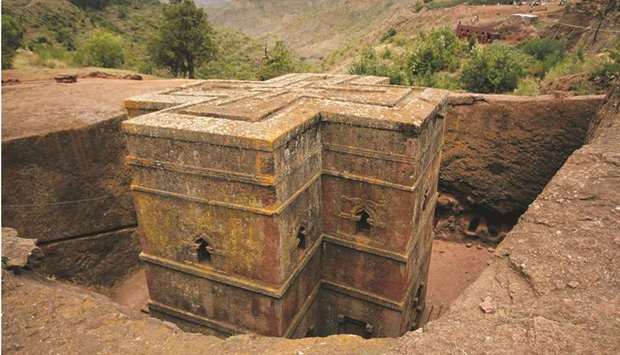Rebel forces from Ethiopia’s war-torn Tigray have rebuffed US calls to leave neighbouring regions, one day after they seized famed Unesco heritage site Lalibela, the latest turn in the nine-month conflict.
“Nothing of the sort is going to happen unless the blockade is lifted,” said Getachew Reda, spokesman for the Tigray People’s Liberation Front (TPLF), referring to restrictions on humanitarian access.
Northern Ethiopia has been wracked by fighting since last November, when Prime Minister Abiy Ahmed sent troops to topple the TPLF, the then-ruling party of Tigray which dominated national politics for nearly three decades until 2018.
The move came in response to TPLF attacks on army camps, Abiy said.
Although he promised a swift victory, the war took a stunning turn in June when pro-TPLF forces recaptured the Tigray capital Mekele and the Ethiopian army largely withdrew.
Since then the TPLF forces have pushed east into the neighbouring Afar region as well as south into Amhara.
Top US officials including US aid chief Samantha Power, who visited Ethiopia this week, have urged the TPLF to withdraw and asked all sides to cease hostilities and focus instead on addressing the humanitarian “catastrophe” in Tigray.
On Thursday, TPLF fighters entered Lalibela without a fight, as security forces withdrew ahead of their advance, residents told AFP.
The move prompted Amhara’s government to warn that the TPLF was pressing “deep” into Amhara territory and to hint at possible retaliation.
Getachew said the push into Lalibela was part of a bid to secure roads in northern Amhara and prevent pro-government forces from regrouping.
“You see, we are under siege. We are under blockage. Anything that Abiy is going to use to maintain its chokehold on our people, we’ll make sure it doesn’t pose a serious problem,” he said.
Lalibela is home to 12th-century rock-hewn churches that are a major tourist draw in peacetime, as well as an airport.
Yesterday pro-TPLF forces were in “hot pursuit” of Amhara regional forces who had headed north from Lalibela to the town of Sekota, Getachew said.
The Amhara wing of Abiy’s ruling Prosperity Party said the TPLF was walking into “a trap” by moving away from its base in Tigray, adding: “And this is how we will be able to punish it without mercy.”
Getachew said the TPLF does not have designs on holding territory in Amhara and Afar and is instead focused on facilitating aid access.
It remains committed, though, to retaking areas of western and southern Tigray that have been occupied by Amhara forces since the war’s early stages, he said.
Amhara leaders have rejected calls by the US and other world powers to exit those territories, claiming that they historically fall under Amhara control.
The dispute bodes ill for ceasefire calls that have become more intense in recent days.
UN humanitarian chief Martin Griffiths wrapped up a visit to Ethiopia this week by declaring “we need the war to end”.
The UN says fighting in Tigray has pushed 400,000 people into famine-like conditions, and estimates that more than 100,000 children could suffer from life-threatening acute malnutrition in the next 12 months.
The TPLF accuses Abiy’s government of blocking aid to Tigray, and top humanitarian officials continue to decry bureaucratic and other hurdles hindering access.
The government says a unilateral ceasefire it announced in late June was intended to allow aid in, and that the TPLF’s subsequent offensive undermines that effort.
Yesterday Abiy’s office reported an additional 63 trucks of food aid had reached Mekele, taking the total figure to 220 in recent weeks.
Spokeswoman Billene Seyoum said on Thursday that more than 300,000 people had been displaced by recent fighting in Amhara and Afar.
Amhara deputy president Fanta Mandefro told AFP on Thursday that the rebels were responsible for abuses, including killings and sexual assault.
Getachew dismissed those claims.
“We are in fact working with the people to make sure they go about their lives as normally as they could,” he said.
The US State Department on Thursday urged the rebels to protect Lalibela, but Getachew said the concerns were misplaced.
“We know what it means to protect heritage sites,” he said. “Lalibela is our heritage site as well. They shouldn’t worry about our forces protecting or not protecting Lalibela.”
Multiple heritage sites in Tigray have been significantly damaged during the conflict, notably monasteries and other places of worship, though Tigrayans have generally blamed pro-government forces for the destruction.

This 2011 picture shows the Bet Medhane Alem rock church in Lalibela.
